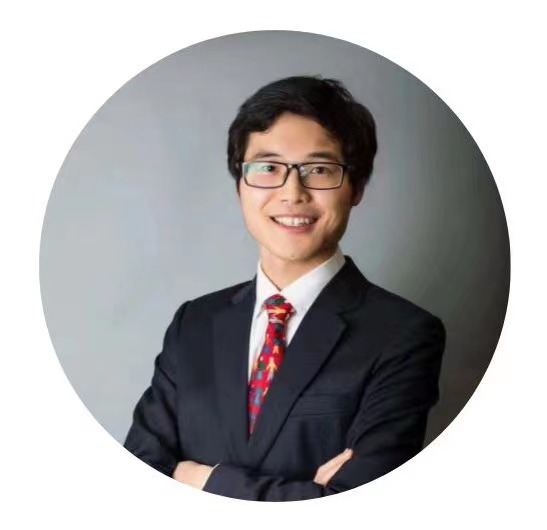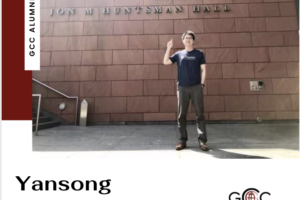Introduction
Please give a short self-introduction
Hello everyone! My name is Marshall. I was in charge of the Technology section in the GCC Global team from 2016 to 2017. I’m doing research in psychology right now and I’m about to start my Ph.D.
GCC
Could you please share your experience at GCC? What was your most memorable experience there?
When I first joined GCC, it was still in an early stage, where it was difficult to invite influential people. I think one of the important ways to gain recognition is to impress others persistently with core values. I believe that quantitative changes will lead to a qualitative change, and it turned out to be true. Our team worked hard on it, and gradually, we received more and more recognition.
How did your experience with GCC help you in your later career? How did you transfer your skills and knowledge learned at GCC into your own professional work? Your own professional work?
In GCC, I think I’ve learned a lot about the way to deal with and communicate with different people, the way to keep an open mind to accept different things to broaden my knowledge, and the way to know more people and help myself to better position myself. I think the gain of communicating with different people is very valuable.
Research experience
You had multiple research experiences. What makes you decide to immerse into research field instead of entering the industry?
Since I’m very interested in research, I decided to enter a lab to get some experience in a full-time research job, after which I thought the experience really fit my expectations, so I applied for a Ph.D. to continue doing research. I attended Carleton College as an undergraduate. The school has a three-semester system, which made the academic pressure heavy and the pace was fast. Therefore, I had less time to think carefully about my future direction, and I hope I can get a chance out of class, having my own time to figure out what I want to do in the future.
What are some skills that you think are essential to do researches?
I think first you need to have enough motivation. Tasks were specific during undergraduate years, such as getting a good grade, solving a math problem, writing an essay, etc., but we might not know the answer to the question when you’re doing research. Sometimes not only do we not know the answers, but we also don’t know how to ask them. At this time, you need to learn on your own and communicate with your mentor. If you have no drive or don’t know how to use your drive, then doing research can be painful because you may not be able to find the answer to your question.
Another thing is not to work behind closed doors. You have to know what other people are doing and learn from their experiences. In other aspects, we should know how to communicate with others, how to make a good presentation to express ourselves, and at the same time, we should be able to share our results clearly and get our audience motivated.
What does a typical day look like for you?
There are some differences before and after the outbreak. Before the epidemic, since I was in a good state in the morning, I would use the time doing thoughtful work such as reading the literature or writing something. Every Monday, Wednesday, and Friday, I communicate with my tutor, and then on Tuesdays and Thursdays, we have a meeting with the whole group of more than ten people. My efficiency is relatively low in the afternoon, so I usually implement the code I designed in the morning. My research is about clinical psychology, so sometimes I need to communicate with my patients in the afternoon. The evening is the second stage of my high efficiency, where I have more freedom to spend my time and do my own things. For example, during the application season, I wrote papers. I usually write code or read literature I like. Sometimes I also chat with my friends to get myself recharged. What has changed since the pandemic is that we can’t go to the lab to do experiments, like take patients for scans and MRIs, etc. Therefore, the work is more about working with existing data, like processing raw data and missing data.
What is the biggest challenge you’ve faced in doing researches?
I think a relatively essential challenge is learning to prioritize and to manage up. Doing research requires constant communication with your mentor. If he/she gets some emotions, you need to learn how to deal with them.
Another challenge is to determine your future direction, because no one can help you with it, but only through your own efforts and exploration. As for me, there are two directions: 1) conduct research and 2) open a psychological counseling room. When I start exploring my path, I would start to verify if I am capable of doing something like this. During the process, I might have different thoughts and ideas on my future path.
I hope to combine experiments with theory in my work right now. The reason why I didn’t choose psychological counseling is that I thought it only helps a limited number of people. However, I can establish connections with more scholars or educators by doing research, having a wider coverage, which I think is more in line with what I want to do.
Future path:
Do you have any other advice for college students or even recent graduates?
Because of the COVID-19, many meetings are held online, so I encourage you to reach out to the guests. In general, very few people take the initiative to reach out, but objectively speaking, these guests always leave time to interact with those attending the event. We can talk with them about what they’ve done and think about how we might relate to them. I think there are a lot of interesting things one can gain through such communication, and it can also help us expand our horizons and burst out new ideas. People of similar age, in particular, tend to have a higher response rate and are more empathic with what you’re doing.








